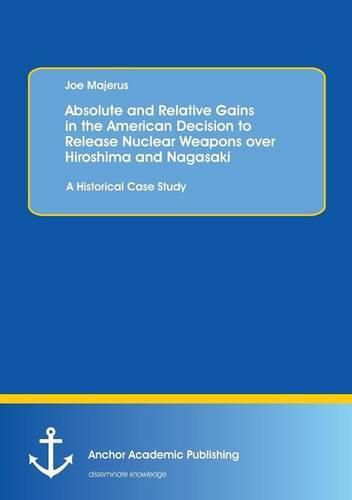Readings Newsletter
Become a Readings Member to make your shopping experience even easier.
Sign in or sign up for free!
You’re not far away from qualifying for FREE standard shipping within Australia
You’ve qualified for FREE standard shipping within Australia
The cart is loading…






This title is printed to order. This book may have been self-published. If so, we cannot guarantee the quality of the content. In the main most books will have gone through the editing process however some may not. We therefore suggest that you be aware of this before ordering this book. If in doubt check either the author or publisher’s details as we are unable to accept any returns unless they are faulty. Please contact us if you have any questions.
The question of whether states pursue absolute or relative gains has divided neo-realism and neo-liberalism for quite some time now. Thus whereas neo-realists contend that states seek comparative advantages relative to others, neo-liberal scholars argue that they are primarily interested in absolute individual gains. In applying social-constructivist ideas, however, this book will demonstrate that such a preference for relative or absolute gains is not naturally predetermined, but inextricably linked to the continual ‘re-construction’ of states’ national identities and interests. By analyzing the Truman Administration’s decision for using nuclear weapons against Hiroshima and Nagasaki, this case study will show that American leaders were much more preoccupied with achieving absolute rather than relative gains. Such absolute considerations were influenced by the pressures of an anarchic self-help system, specific domestic imperatives and the personal views of individual policy-makers who believed that only swift socio-economic recovery and the creation of a more peaceful security environment would ultimately ensure their country’s long-term international position.
$9.00 standard shipping within Australia
FREE standard shipping within Australia for orders over $100.00
Express & International shipping calculated at checkout
This title is printed to order. This book may have been self-published. If so, we cannot guarantee the quality of the content. In the main most books will have gone through the editing process however some may not. We therefore suggest that you be aware of this before ordering this book. If in doubt check either the author or publisher’s details as we are unable to accept any returns unless they are faulty. Please contact us if you have any questions.
The question of whether states pursue absolute or relative gains has divided neo-realism and neo-liberalism for quite some time now. Thus whereas neo-realists contend that states seek comparative advantages relative to others, neo-liberal scholars argue that they are primarily interested in absolute individual gains. In applying social-constructivist ideas, however, this book will demonstrate that such a preference for relative or absolute gains is not naturally predetermined, but inextricably linked to the continual ‘re-construction’ of states’ national identities and interests. By analyzing the Truman Administration’s decision for using nuclear weapons against Hiroshima and Nagasaki, this case study will show that American leaders were much more preoccupied with achieving absolute rather than relative gains. Such absolute considerations were influenced by the pressures of an anarchic self-help system, specific domestic imperatives and the personal views of individual policy-makers who believed that only swift socio-economic recovery and the creation of a more peaceful security environment would ultimately ensure their country’s long-term international position.